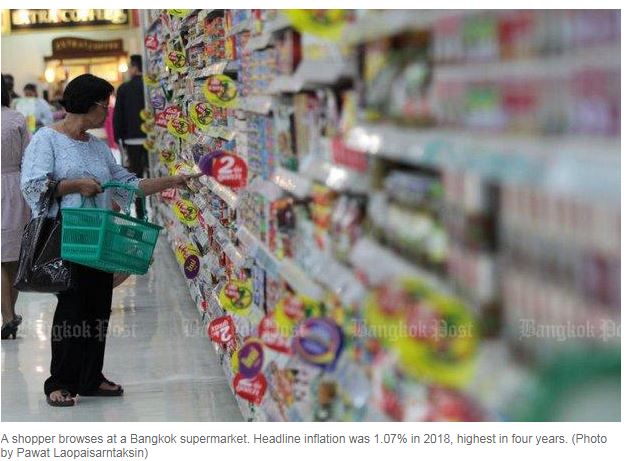Thailand: Inflation reached 4-year high in 2018
Thailand’s annual headline inflation rose to a four-year high in 2018, boosted by energy and house rent, but the rate still moved in the target range set by the government.
The Trade Policy and Strategy Office under the Commerce Ministry reported Wednesday that headline inflation, gauged by the increase in the consumer price index (CPI), was 1.07% for the whole year in 2018, up from 0.66% in 2017, 0.19% in 2016 and -0.9% in 2015.
The higher inflation came despite the growth rate easing for the fourth straight month in December as a result of lower energy prices and some cheaper agricultural products due to excess supply.
Consumer prices rose 0.36% in December from the same month a year earlier, down from 0.94% in November, 1.23% in October, 1.33% in September and 1.62% in August.
On a month-to-month basis, prices contracted 0.65% from November, due to a decline in the prices of oil and fresh fruits and vegetables.
Core CPI, which excludes volatile food and energy prices, rose 0.68% year-on-year in December and 0.01% from November. For the entire year, core inflation averaged 0.71%.
Pimchanok Vonkorpon, the office’s director-general, said last year’s inflation rise was driven by continuously higher energy prices that affected the prices of goods and services related to energy, rising prices of certain key farm products and processed food, and higher domestic demand.
“Last year’s inflation rate, which stood at 1.07%, is considered a stable increase and under the target rate of 0.7-1.7% set by the Commerce Ministry,” Ms Pimchanok said. “We expect the rate to stay at an average 1.23% for this year, or in the range of 0.7-1.7%.”
The forecast was made assuming GDP growth of 3.5-4.5%, crude oil prices averaging US$70-80 per barrel and an exchange rate of 32.50-33.50 baht to the US dollar.
Supporting factors that will affect inflation this year are public and private investments, which are expected to turn more favourable in 2019 as suggested by many leading indicators such as progress in new and existing infrastructure development projects and an increase in applications for investment.
Farm product prices are expected to continue to improve from 2018, especially for rice and cassava, whose new crop continues to be harvested through the first quarter of 2019.
Growers of oil palm and rubber, however, will see their prices increase because of several government measures, Ms Pimchanok said.
Industrial product prices, meanwhile, may not change too much but need to be closely monitored because of two pressures from a production-cost rise and another from intensified competition, especially from imported products such as steel.
Thailand’s exports will maintain growth momentum from 2018 alongside the global economic recovery, Ms Pimchanok said. They will also gain from the high possibility of production bases being relocated to Thailand, which also brings about a rise in domestic prices and purchasing power, while the baht’s exchange rate is likely to depreciate upon the US economic recovery and a slowdown of capital inflows.
This will add to import costs and raise export revenue, which eventually will boost inflation, according to Ms Pimchanok.
“Consumer prices in 2019 are expected to continue to expand at the close rate of 2018,” she said. “The rate is expected to stay at 0.86% in the first quarter [excluding the election factor], 0.98% in the second quarter, 1.27% in the third quarter and 1.81% in the fourth quarter.”
Nonetheless, if the election factor in February is included, consumer prices in the first quarter may increase by more than 0.86%, she said, driven by money circulation from election campaign spending such as on billboard ads and pickup trucks.”
Thanavath Phonvichai, vice-president for research at the University of the Thai Chamber of Commerce, said GDP growth is still limited in some areas and has yet to flash clear signals of strong growth.
Source: https://www.bangkokpost.com/business/news/1604542/inflation-reached-4-year-high-in-2018


 Thailand
Thailand




